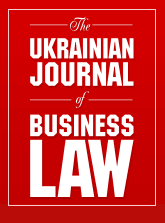If a company infringes competition law, it must reckon with a range of possible sanctions, both under public and private law. The public enforcement is well known – competition authority launches an investigation against a suspected party. If an infringement is found, the authority will typically order termination of anticompetitive behavior and, most importantly– will impose a fine.
Sanctions of private law nature, also known as private enforcement, are less common, especially in Ukraine. Most typically this is achieved through seeking compensation for damages incurred as a result of anticompetitive behavior. Thus, when a competition authority determines that there was an infringement of competition law, anyone harmed by such infringement is entitled to compensation and may file a claim for damages. Such proceedings are usually referred to as "follow-on" damages actions.
Legal grounds
Under the EU legislation[1], any person who suffered damages caused by an infringement of competition law is able to claim and obtain full compensation, which covers actual loss, loss of profit, plus the payment of interest compensation. According to the latest official statistics of the European Commission, follow-on damages actions are fairly widespread – approximately 25% of decisions lead to damages actions whereas the extent of this damage ranges between EUR 5.6–23.3 billion per year[2].
In Ukraine, article 55 of the Law on Protection of Economic Competition (the Law) provides for the similar provisions on the right for compensation. Furthermore, for certain types of competition infringements – for example a cartel that overpriced goods or services or abuse of dominance that led to passing-on of overcharges – the infringed party is entitled to double compensation. Respective provisions were introduced in the Law in 2001 and did not change since then. Potentially, the Law provides for even more favorable regime than the aforementioned Directive, however, for almost two decades damages actions in Ukraine remained a sleeping giant with only few notable cases.
Any court practice?
Cases on the matter started to emerge in 2015 when following the decisions of the Antimonopoly committee of Ukraine (the AMC) on bid-rigging cases, Ukrtransgaz PJSC, who was a purchaser for the bids, sued the infringer for double compensation of overpaid funds. The courts of first instance ruled for Ukrtransgaz[3] and ordered to collect UAH 200 million (approx. USD 7,5 million) from the infringer. Unfortunately, the respondent neither defended itself in the court of first instance, nor filed an appeal.
The actual landmark case on the matter is arguably a court decision on Nibulon. In that case Nibulon, which was the major customer of Ukrainian Railways' carriage services, sued the latter for compensation of overpaid funds after the AMC adopted a decision on abuse by Ukrainian Railways of its dominant position on the relevant market. After 2 years of proceedings before Ukrainian courts, the Supreme Court ruled final decision[4] for Nibulon and ordered to collect UAH 120 million (approx. USD 4,5 million) from Ukrainian Railways. The main question before the court was the application of limitation periods. Ukrainian Railways stated that the limitation period should be 1 year, as prescribed for claims on carriage of goods, and starts from the date when Nibulon filed a complaint to Ukrainian Railways regarding high charge for services. Eventually the courts dismissed these arguments and ruled that for damages actions claims a general limitation period of 3 years should apply, which starts running from the date when the AMC renders a decision on infringement of competition law.
Another promising case is still in the appeal stage. Following the AMC decision on abuse of dominance by Amic Aviation, Ukraine International Airlines, who was a customer of fuel for aircraft, sued Amic Aviation for double compensation of overpaid funds. The court of first instance ruled[5] for Ukraine International Airlines and ordered to collect more than UAH 130 million (approx. USD 4,8 million) from Amic Aviation. The court dismissed arguments of Amic Aviation regarding erroneous sum of compensation and stated that amount of damages accrued by Ukraine International Airlines is even lower that could possibly be collected based on case evidence and requested compensation is due to Ukraine International Airlines "beyond reasonable doubt".
The first brick was laid
Obviously, the court enforcement practice in private damages is scarce. Still, it already lays good basis for further development of private antitrust enforcement. For a long time uncertainties related to running of limitation periods and challenges to the amount of accrued damages were the stumbling stones which discouraged from spending time and resources on damages actions. Now the path is beaten. Will the sleeping giant awake?
[1] Directive 2014/104/EU of the European Parliament and of the Council of 26 November 2014 on certain rules covering actions for damages under national law for infringements of the competition law provisions of the Member States and of the European Union.
[2] Commission, Impact Assessment Report SWD (2013) 204 final.
[3] Cases 911/3994/15 and 911/3382/14.










